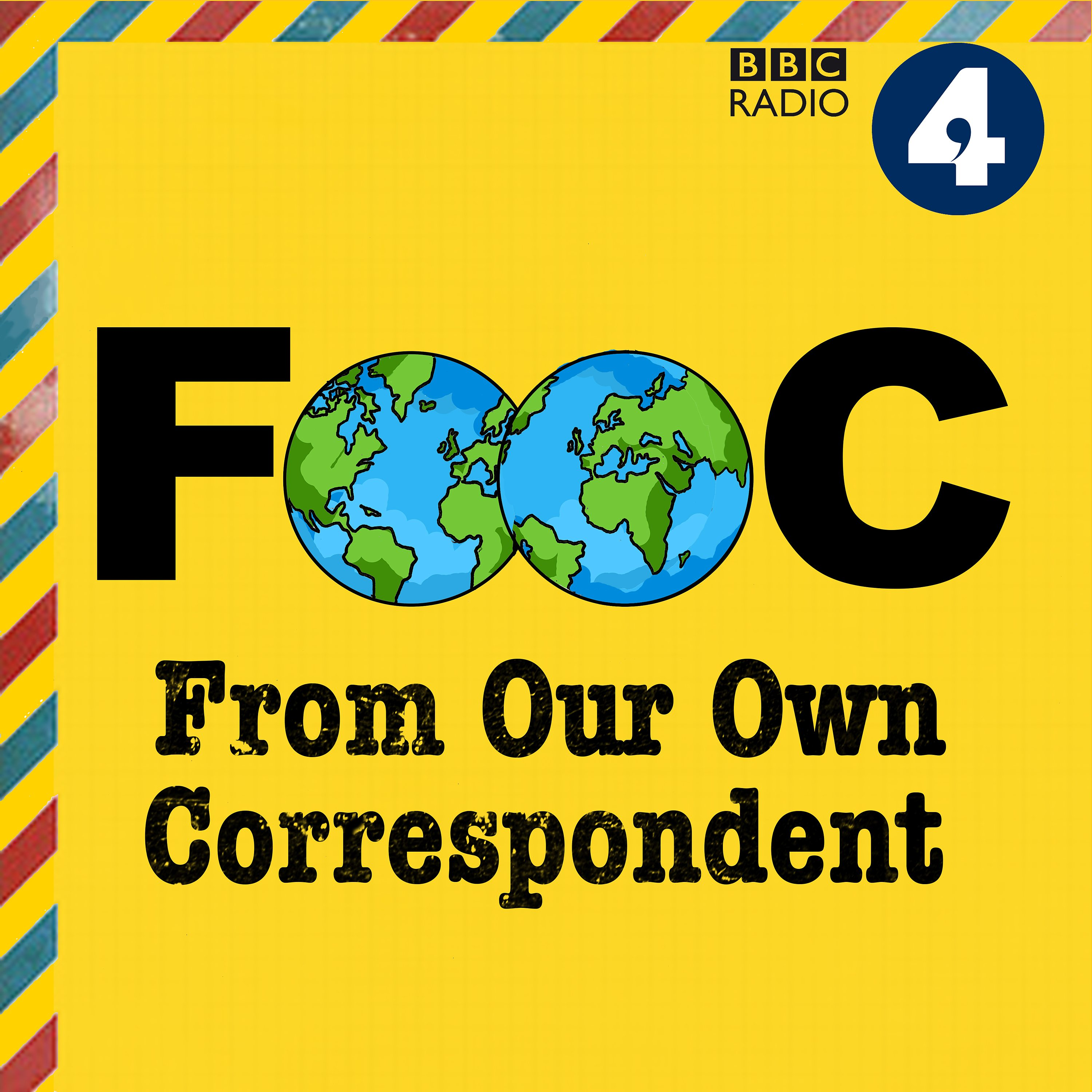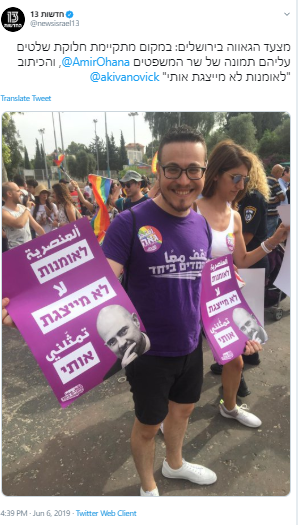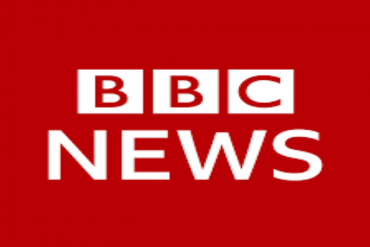A week after her audio report about the Jerusalem pride march had been broadcast on BBC World Service radio and BBC Radio 4, Yolande Knell recycled the same material in an item aired in the June 13th edition of BBC Radio 4’s ‘From Our Own Correspondent’.
“As Pride events take place all over the world this month to recognise LGBT communities and to highlight ongoing campaigns for equal rights, Yolande Knell reports on Pride in Israel.”
With listeners once again not informed that the only country in her Middle East patch where Knell could produce such a report is Israel, presenter Kate Adie introduced the item (from 05:54 here) as follows: [emphasis in italics in the original, emphasis in bold added]
Adie: “It’s the month of campaign and celebration for LGBT – Lesbian, Gay, Bisexual and Transgender – communities. Equal rights are by no means recognised universally and in Israel tomorrow tens of thousands are expected at the Tel Aviv pride parade. Last week the country appointed its first openly gay cabinet minister but a staged mass wedding for gay couples and trouble at the pride march in Jerusalem highlight unresolved tensions according to Yolande Knell.”
Exactly how Knell defines “trouble” would emerge later on in the report. She began however with an event which took place in the Sarona complex in Tel Aviv on June 4th. Interestingly, Knell’s account included messaging and motifs seen in an AP report about that event.
Knell: “Beaming, Nikita stomps on a glass wrapped in foil to cries of muzl [sic] tov – congratulations. But this isn’t a traditional Jewish wedding: it’s a symbolic one. Nikita and his long-time partner Roy are in a row of 23 gay couples hugging and kissing. All walked down the aisle and took vows at an open-air mass ceremony in Tel Aviv.”
Although the Sarona complex is an open-air venue with no “aisle” to walk down, that phrase was also found in AP’s report.
AP: “Tuesday’s event involved an unofficial wedding ceremony for 23 gay couples, who walked down the aisle, took vows and danced at a banquet, cheered by friends, family and supporters.”
Knell went on:
Knell: “But while same-sex marriages are increasingly recognised around the world, here in Israel they’re still not legal. The state doesn’t permit any civil marriages – only religious ones – and there’s no religious gay marriage option. ‘We participated so everyone would see us and know we exist’ Nikita says. ‘We love each other, we want to be married and have a normal life’.”
As was the case in her earlier report, Knell did not bother to inform listeners that while civil marriage is not available in Israel (rather than not “legal”) for either heterosexual or homosexual couples, ceremonies performed abroad are recognised by the state.
The AP report states:
AP: “The annual pride parade, set for June 14, draws flocks of foreign visitors to Israel, which flaunts itself as one of the world’s most gay-friendly tourist destinations.”
Yolande Knell told Radio 4 listeners that:
Knell: “Tel Aviv’s gay-friendly reputation – which it recently flaunted while hosting the Eurovision Song Contest – draws many same-sex Israeli couples to live here as well as lots of foreign visitors. Every year its pride parade along the beach has a carnival atmosphere. Young and old, gay and straight join the huge party, many dressed in flamboyant outfits or skimpy swimming costumes.”
The AP report goes on:
AP: “Yet political rights for Israel’s gay community lag behind increasingly widespread cultural acceptance.”
Yolande Knell went on:
Knell: “But in Israel rights for the gay community fall behind rising cultural acceptance in society.”
AP readers were told that:
AP: “Jewish ultra-Orthodox parties, which wield significant influence in Prime Minister Benjamin Netanyahu’s right-wing government and have a monopoly over matters of religion and state, have rejected legislation that condones homosexuality, which they see as defying Jewish law.”
Yolande Knell’s listeners were told that:
Knell: “In the Right-wing coalition governments of the prime minister Benjamin Netanyahu, Jewish ultra-orthodox parties have had an influential role. They reject any proposed legislation which they see as condoning homosexuality, saying it defies Jewish law.”
Describing Jerusalem as Israel’s “seat of government” rather than its capital – in accordance with BBC editorial policy – Knell went on:
Knell: “That makes the pride march in Jerusalem – the holy city and Israel’s seat of government – feel more like a protest, although there’s still fancy dress. ‘I can do whatever I want in Tel Aviv and that’s great’ says Shlomit who’s with her gay friend, wearing a unicorn hat. ‘But if I’m not marching in Jerusalem, doing leg-work to demand the rights some people still don’t have, then I don’t have the right to call myself an ally’.
As was the case in her earlier report, Knell made no effort to inform Radio 4 listeners what rights LGBTQ people do have in Israel such as the fact that same sex couples who married abroad enjoy all the same rights as heterosexual married couples, including benefits and survivor rights.
Listeners then learned that Kate Adie’s previous reference to ‘trouble’ in fact means a protest which received an advance permit.
Knell: “Near the start of the parade there’s a reminder of the strong opposition faced by Israel’s gay activists. A small group’s demonstrating against what it calls LGBT terrorism. Its leader Bentzi Gopstein belongs to a far-Right political party which struck a controversial deal with Mr Netanyahu ahead of the last election to shore up conservative votes. ‘This isn’t pride; it’s an abomination’ he shouts over a loudspeaker. ‘It’s not pride if someone can’t contain their lust. Keep Jerusalem holy’.”
In fact, prior to the April election Gopstein’s party ‘Otzma Yehudit’ joined the Jewish Home and National Union parties to form the Union of Right-Wing Parties.
Knell: “With hundreds of police officers lining their route, the marchers pass the spot where a girl of 15 was fatally stabbed by an ultra-orthodox Jewish man during the parade four years ago. Many like Ronni stop to lay a red rose. ‘It’s very sad. It really shows what happens when you allow hatred to flourish’ she says. This crowd brings together secular and religious activists, all calling for greater tolerance even as they reveal conflicting currents in Israeli society. I meet liberal orthodox rabbis and their followers upset at how Jerusalem’s chief rabbi wrote to the mayor asking him to stop rainbow flags being displayed in the city. ‘Judaism’s a pluralistic religion’ says Ze’ev who wears a kippa or skullcap. ‘We’re here for the alternative’.”
Apparently for Knell, religious and secular people automatically ‘conflict’ rather than being simply diverse and co-existing “currents in Israeli society”. Once again she resurrected the story about the city’s chief rabbi’s letter without clarifying that the Jerusalem municipality rejected his request.
Next we discover that – in contrast to the impression given in her previous report – Knell did see the protests against MK Amir Ohana which took place at the Jerusalem march. She did not however bother to inform listeners which organisation was behind those protests and the pre-prepared placards – or of its political leanings.
Knell: “Then, there’s a decidedly mixed reaction to the appearance of Amir Ohana, the newly appointed openly gay justice minister who’s a loyalist of the prime minister. While some shake his hand, others yell ‘shame’ and ‘go home hypocrite’, accusing him of doing little for the LGBT community.”
As in her previous report, Knell amplified inadequately attributed politically motivated allegations of ‘pinkwashing’.
Knell: “There are also strong differences of opinion among gay Palestinians. Social and legal prohibitions on homosexuality mean they don’t have their own pride events so some with access to the Israeli parades embrace them, like an East Jerusalemite drag queen in a tight black dress and bright red lipstick. Others, like Zizou, choose to boycott. ‘Pride week just helps Israel pinkwash its image’ he complains, accusing the country of presenting itself as progressive, liberal and LGBT friendly to distract from its conflict with the Palestinians.”
Before closing her report Knell managed to get a reference to the ‘peace process’ into an item ostensibly about pride marches in Israel while giving an imaginative portrayal of the country’s current “political climate”.
Knell: “This year pride in Israel takes place in a febrile political climate. After a recent bitterly fought election, Mr Netanyahu looked set to form a new government but failed to do so. Now the country must vote again. The campaign’s unlikely to see much talk of peace with the Palestinians but issues of religion and state will be hotly contested once more. Many of those flying rainbow flags this month will be hoping for political changes but they won’t have to look far for proof of how tough those will be.”
And so, for the second time in a week, Knell’s message to BBC audiences in the UK was that the advancement of LGBTQ rights in Israel is held back by “Jewish ultra-orthodox parties” – with no mention of how Arab parties in the Knesset relate to that issue. Yet again Knell failed to inform Radio 4 listeners what LGBTQ rights in Israel do include, while the issue of “social and legal prohibitions on homosexuality” in Palestinian society and the wider region is obviously of no real interest to the BBC’s Middle East correspondent.
Related Articles:
BBC’s Yolande Knell reports one pride march protest, erases another



